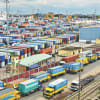ICDs to raise export container charges by 60%

Inland container depots (ICDs) have announced a sharp increase in charges for handling export cargoes and empty containers by as much as 60 percent starting September 1, triggering concerns among exporters already feeling the pinch from the impending reciprocal tariff by the United States.
The Bangladesh Inland Container Depots Association (BICDA) issued a circular on July 15 in this regard, citing rising operational and investment costs, currency devaluation, and inflationary pressures as key reasons behind the decision.
Speaking to The Daily Star on this, BICDA Secretary General Md Ruhul Amin Sikder said, "The charge hike was overdue since the ICDs did not raise charges that much for a decade or more."
"Only the transport cost on the Dhaka-Chattogram highway has increased by more than Tk 20,000 in the last few years but no one ever raised their voice against it."
THE NEW CHARGES
There are 21 privately owned ICDs located in and around the port city. Almost 93 percent of the export-laden containers are handled by 19 ICDs before shipment through Chattogram port.
The ICDs impose various charges for handling export cargoes and containers, including the export stuffing package—a bundled service covering the transport of an empty container from the depot yard to the container freight station (CFS), loading or stuffing of goods into the container, returning the loaded container to the depot yard, and finally transporting it to the port for shipment.
As per the BICDA announcement, the stuffing package charge for a 20-foot container will rise from Tk 6,187 to Tk 9,900, and for a 40-foot container from Tk 8,250 to Tk 13,200—a 60 percent increase.
In addition to the package charge, typically paid by freight forwarders on behalf of foreign buyers, ICDs also collect a landing charge from freight forwarders and a CFS storage charge from shippers or exporters.
The landing charge has been raised from Tk 207 per tonne to Tk 270, and the CFS storage charge has been enhanced from Tk 29 to Tk 45.
According to ICD data, in 2024, ICDs handled 7.50 lakh TEUs of export containers, a 13.5 percent increase from the previous year. More than 80 percent of these containers were 40-foot ones.
Under the newly announced rates, the stuffing package charge for a 40-foot export-laden container will rise by Tk 4,950 to Tk 13,200. This means package charges across export containers could rise by over Tk 300 crore annually, assuming container volumes remain constant.
BICDA leader Sikder said the announced charge hike is very nominal compared to the overall export expenditure. "It would not make any impact on the sector. But it is a must for the survival of the ICDs."
Exporters, however, disagree.
BANGLADESH'S COMPETITIVENESS AT STAKE
The country's export sector has been facing multifaceted challenges in recent months, with goods clearance slowing due to poor server performance at customs stations, protests by officials of the revenue board, political uncertainty, and a devastating reciprocal tariff announced by the US.
Business leaders said if the ICDs start charging more now, Bangladesh will lose its competitiveness in the global market, especially with a 35 percent reciprocal tariff by the US set to come into effect on August 1.
"The decision on increasing charges taken by the BICDA unilaterally is unacceptable, especially at a time when uncertainty shrouds the country's major export earner RMG sector due to higher tariff from the US," Mahmud Hasan Khan, president of the Bangladesh Garment Manufacturers and Exporters Association (BGMEA), said.
He said they would sit with BICDA to solve the issue through discussion.
BGMEA Director Syed M Tanvir said the country's export sector would lose competitiveness due to the ICDs' charge hike.
"Though the buyers pay the charges, the exporters would ultimately suffer since the buyers would add up this additional expense in their overall logistics costing," he pointed out.
"The current logistics costs for exporting from Bangladesh are already higher because our exports need additional transport time as we lack deep seaports. Moreover, our export shipments face frequent delays due to problems in ports and customs," said Tanvir.
Khairul Alam Sujan, former vice president of the Bangladesh Freight Forwarders Association (BAFFA), said the charge increase by the ICDs would raise logistics costs for export shipments from Bangladesh.

 For all latest news, follow The Daily Star's Google News channel.
For all latest news, follow The Daily Star's Google News channel. 








Comments